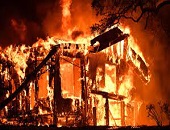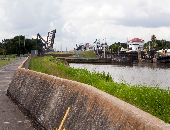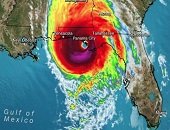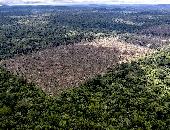Diversifying Wildfire Risk
Climate change is altering risk profiles the world over. In the US, it has led to an increase in wildfire season length, wildfire frequency, and the size of burned area. When it comes to such disasters, is the economic risk only borne by those in the risky area, or can the economic risk be shared among investors? A recent webinar looked at a longstanding tool for financial adaptation. For nearly a century, mortgages have been used to create mortgage-backed securities (MBSs) in order to share the risk (and thus the return) of financing real estate. “What are the benefits of […]
Flood Economics
When it comes to natural disasters such as flooding, does it make more economic sense to control the flood? Or to sit back, suffer the consequences, and count on insurance? Climate change leads to more frequent and more intense flooding. As these risks intensify, public funds will often be used to protect communities. Recent work done by economists estimates the amount and distribution of benefits from a major form of public flood risk adaptation, flood control levees. A levee is an embankment built to prevent the overflow of a river. The efficiency and equity implications of levees were investigated by […]
The Role of Insurance in Recovery
Climate change is bringing on events, such as hurricanes and wildfires, of greater severity and frequency than ever before. How does insurance help communities rebuild? What economic barriers arise during recovery? Is insurance the best way to provide disaster relief? These are some of the questions tackled by Carolyn Kousky of the Environmental Defense Fund (EDF) in her recent book and research. She is a co-editor of A Blueprint for Coastal Adaptation and author of Understanding Disaster Insurance: New Tools for a More Resilient Future. On October 19, 2023, Carolyn Kousky, Associate VP, Economics and Policy Analysis at EDF, gave a presentation on […]
The Greenium
Does the average household want to invest in climate-friendly assets? If so, what proportion of assets are earmarked for green investments? What kinds of assets (equity or fixed income) are preferred? “Green investments are popular, but only about one-third of German households have some kind of green account,” said Monika Piazzesi, Professor of Economics at Stanford University. She was speaking at a webinar titled “Household Climate Finance: Theory and Survey Data on Safe and Risky Green Assets,” held on September 7, 2023, as part of the Virtual Seminar on Climate Economics sponsored by the Federal Reserve Bank of San Francisco (FRBSF). Her […]
Carbon Pricing
What is the best way to address climate change? If too much carbon is released in the air, how can emissions be reduced? By regulating corporations or by imposing costs on consumers in the form of a carbon tax? Moreover, even if a solution is found, not all nations, and not all people within nations, will agree on how to tackle the problem. In the words of Professor Barry Rabe, author of Can We Price Carbon? “Compelling ideas from economics do not necessarily suspend the laws of politics.” On May 4, 2023, Jessica Green, professor of political science at University […]
Heated Exchange
Climate-related natural disasters are increasing in frequency and severity and costs. Since climate change is not equal across countries, how does a country’s exchange rate respond to such shocks? Furthermore, is it possible to build an economic model to predict future changes? On April 6, 2023, Galina Hale, professor of economics at the University of California at Santa Cruz, delivered a webinar about the effect of climate change on exchange rates. This was part of the series of talks sponsored by the Federal Reserve Bank of San Francisco (FRBSF), titled the Virtual Seminar on Climate Economics. She reported results from […]
Green Stocks vs. Brown
Comparing the stock prices of climate-friendly (“green”) companies versus non-climate-friendly (“brown”) companies, which type will give better performance? Has this prediction been changing over the past decade—and why? And what are the recent pressures? On March 23, 2023, Michael Bauer, professor of economics at the University of Hamburg, delivered a webinar on green vs. brown stocks as part of the series of talks sponsored by the Federal Reserve Bank of San Francisco (FRBSF), titled the Virtual Seminar on Climate Economics. He reported results from a recent paper co-authored with three other economists appearing in the Journal of Climate Finance. Bauer […]
The Forest Awakens
The Amazon rainforest is an iconic world ecosystem often referred to as “the lungs of the planet.” Yet it is being destroyed day by day. What systems are in place to monitor loss of valuable ecosystems? How effective are these systems? In 2019, the United Nations announced the “UN Decade on Ecosystem Restoration.” This international body estimates that restoration of 350 million hectares of degraded land between now and 2030 could generate USD 9 trillion in ecosystem services and take an additional 13-26 gigatons of greenhouse gases out of the atmosphere, gases that are warming the planet. On March 9, […]









